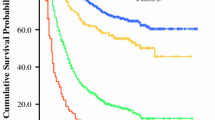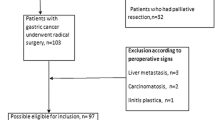Abstract
Background
This study aims to elucidate whether increasing the number of examined lymph nodes (NELN) is mandatory for the accurate prognosis of node-negative gastric cancer (GC) patients after curative gastrectomy in Eastern countries (China and Japan).
Methods
The clinicopathological data of 2455 GC patients (including 1137 node-negative cases) were included to demonstrate whether a minimum NELN is inevitable for guaranteeing the accurate prognosis of node-negative GC patients after curative gastrectomy.
Results
Survival analyses revealed that the NELN significantly positively correlated with overall survival (p < 0.001) and was an independent prognostic predictor (hazard ratio 0.447; p = 0.025) of 1137 node-negative GC patients. Stratum analysis within the Kaplan–Meier method showed that sex, tumor size, and extent of lymphadenectomy did not affect the NELN in predicting the prognosis of all node-negative GC patients. Stage migration was mainly detected in the subgroup of node-negative GC Chinese patients who presented considerably lower mean NELN and more advanced staging than patients from Japan. The NELN was identified as the most intensively independent predictor of prognosis of 600 node-negative GC patients from China, with the smallest Akaike information criterion (176.964) and Bayesian information criterion values (194.552). These findings indicate that increasing the NELN is a prerequisite to guaranteeing precise TNM classification.
Conclusions
The NELN should be considered a mandatory requirement for improving the accuracy of prognostic evaluation of GC patients, especially for advanced-stage patients.

Similar content being viewed by others
References
Deng J, Zhang R, Pan Y, Wang B, Wu L, Jiao X, et al. Comparison of the staging of regional lymph nodes using the sixth and seventh editions of the tumor-node-metastasis (TNM) classification system for the evaluation of overall survival in gastric cancer patients: findings of a case-control analysis involving a single institution in China. Surgery. 2014;56:64–74.
Marrelli D, Morgagni P, de Manzoni G, Coniglio A, Marchet A, Saragoni L, et al. Prognostic value of the 7th AJCC/UICC TNM classification of noncardia gastric cancer: analysis of a large series from specialized Western centers. Ann Surg. 2012;255:486–91.
de Manzoni G, Verlato G, Roviello F, Morgagni P, Di Leo A, Saragoni L, et al. The new TNM classification of lymph node metastasis minimises stage migration problems in gastric cancer patients. Br J Cancer. 2002;87:171–4.
Bouvier AM, Haas O, Piard F, Roignot P, Bonithon-Kopp C, Faivre J. How many nodes must be examined to accurately stage gastric carcinomas? Results from a population based study. Cancer. 2002;94:2862–6.
Biffi R, Botteri E, Cenciarelli S, Luca F, Pozzi S, Valvo M, et al. Impact on survival of the number of lymph nodes removed in patients with node-negative gastric cancer submitted to extended lymph node dissection. Eur J Surg Oncol. 2011;37:305–11.
Li Y, Du P, Zhou Y, Cheng Q, Chen D, Wang D, et al. Lymph node micrometastases is a poor prognostic factor for patients in pN0 gastric cancer: a meta-analysis of observational studies. J Surg Res. 2014;191:413–22.
Huang JY, Xu YY, Li M, Sun Z, Zhu Z, Song YX, et al. The prognostic impact of occult lymph node metastasis in node-negative gastric cancer: a systematic review and meta-analysis. Ann Surg Oncol. 2013;20:3927–34.
Song W, Yuan Y, Wang L, He W, Zhang X, Chen C, et al. The prognostic value of lymph nodes dissection number on survival of patients with lymph node-negative gastric cancer. Gastroenterol Res Pract. 2014;2014:603194.
Bunt AM, Hermans J, van de Velde CJ, Sasako M, Hoefsloot FA, Fleuren G, et al. Lymph node retrieval in a randomized trial on Western-type versus Japanese-type surgery in gastric cancer. J Clin Oncol. 1996;14:2289–94.
Candela FC, Urmacher C, Brennan MF. Comparison of the conventional method of lymph node staging with a comprehensive fat-clearing method for gastric adenocarcinoma. Cancer. 1990;66:1828–32.
Sobin LH, Fleming ID. TNM classification of malignant tumors. Cancer. 1997;80:1803–4.
Karpeh MS, Leon L, Klimstra D, Brennan MF. Lymph node staging in gastric cancer: is location more important than number? An analysis of 1038 patients. Ann Surg. 2000;232:362–71.
Deng JY, Liang H, Sun D, Pan Y, Zhang RP, Wang BG, et al. Outcome in relation to numbers of nodes harvested in lymph node-positive gastric cancer. Eur J Surg Oncol. 2009;35:814–9.
Sobin L, Gospodarowicz M, Wittekind C. TNM classification of malignant tumours. 7th ed. New York: Wiley; 2009.
Rausei S, Dionigi G, Boni L, Rovera F, Dionigi R. How does the 7th TNM edition fit in gastric cancer management? Ann Surg Oncol. 2011;18:1219–21.
Baiocchi GL, Tiberio GA, Minicozzi AM, Morgagni P, Marrelli D, Bruno L, et al. A multicentric Western analysis of prognostic factors in advanced, node-negative gastric cancer patients. Ann Surg. 2010;252:70–3.
He H, Shen Z, Wang X, Qin J, Sun Y, Qin X. Survival benefit of greater number of lymph nodes dissection for advanced node-negative gastric cancer patients following radical gastrectomy. Jpn J Clin Oncol. 2016;46:63–70.
Jiao XG, Deng JY, Zhang RP, Wu LL, Wang L, Liu HG, et al. Prognostic value of number of examined lymph nodes in patients with node-negative gastric cancer. World J Gastroenterol. 2014;20:3640–8.
Li B, Li Y, Wang W, Qiu H, Seeruttun SR, Fang C, et al. Incorporation of N0 stage with insufficient numbers of lymph nodes into N1 stage in the seventh edition of the TNM classification improves prediction of prognosis in gastric cancer: results of a single-institution study of 1258 Chinese patients. Ann Surg Oncol. 2016;23:142–8.
Jaehne J, Meyer HJ, Maschek H, Geerlings H, Burns E, Pichlmayr R. Lymphadenectomy in gastric adenocarcinoma: a prospective and prognostic study. Arch Surg. 1992;127:290–4.
Nakajima T. Gastric cancer treatment guidelines in Japan. Gastric Cancer. 2002;5:1–5.
Smith DD, Schwarz RR, Schwartz RE. Impact of total lymph node count on staging and survival after gastrectomy for gastric cancer: data from a large US-population database. J Clin Oncol. 2005;23:7114–24.
Nitsche U, Maak M, Schuster T, Künzli B, Langer R, Slotta-Huspenina J, et al. Prediction of prognosis is not improved by the seventh and latest edition of the TNM classification for colorectal cancer in a single-center collective. Ann Surg. 2011;254:793–800.
Cho YK, Chung JW, Kim JK, Ahn YS, Kim MY, Park YO, et al. Comparison of 7 staging systems for patients with hepatocellular carcinoma undergoing transarterial chemoembolization. Cancer. 2008;112:352–61.
Songun I, Putter H, Kranenbarg EM, Sasako M, van de Velde CJ. Surgical treatment of gastric cancer: 15-year follow-up results of the randomised nationwide Dutch D1D2 trial. Lancet Oncol. 2010;11:439–49.
Deng J, Liang H, Sun D, Zhang R, Zhan H, Wang X. Prognosis of gastric cancer patients with negative node metastasis following curative resection. Outcomes of the survival and recurrence. Can J Gastroenterol. 2008;22:835–9.
Jeong JY, Kim MG, Ha TK, Kwon SJ. Prognostic factors on overall survival in lymph node negative gastric cancer patients who underwent curative resection. J Gastric Cancer. 2012;12:210–6.
Chu X, Yang ZF. Impact on survival of the number of lymph nodes resected in patients with lymph node-negative gastric cancer. World J Surg Oncol. 2015;13:192.
Xu D, Huang Y, Geng Q, Guan Y, Li Y, Wang W, et al. Effect of lymph node number on survival of patients with lymph node-negative gastric cancer according to the 7th edition UICC TNM system. PLoS One. 2012;7:e38681.
Deng J, Zhang R, Zhang L, Liu Y, Hao X, Liang H. Negative node count improvement prognostic prediction of the seventh edition of the TNM classification for gastric cancer. PLoS One. 2013;8:e80082.
Deng JY, Liang H, Wang DC, Sun D, Ding X, Pan Y, et al. Enhancement the prediction of postoperative survival in gastric cancer by combining the negative lymph node count with ratio between positive and examined lymph nodes. Ann Surg Oncol. 2010;17:1043–51.
Deng J, Sun D, Pan Y, Zhang L, Zhang R, Wang D, et al. Ratio between negative and positive lymph nodes is suitable for evaluation the prognosis of gastric cancer patients with positive node metastasis following curative surgery. PLoS One. 2012;7:e43925.
Deng J, Zhang R, Wu LL, Zhang L, Wang X, Liu Y, et al. Superiority of the ratio between negative and positive lymph nodes for predicting the prognosis for patients with gastric cancer. Ann Surg Oncol. 2015;22:1258–66.
Yonemura Y, Endo Y, Hayashi I, Kawamura T, Yun HY, Bandou E. Proliferative activity of micrometastases in the lymph nodes of patients with gastric cancer. Br J Surg. 2007;94:731–6.
Jeuck TL, Wittekind C. Gastric carcinoma: stage migration by immunohistochemically detected lymph node micrometastases. Gastric Cancer. 2015;18:100–8.
Funding
This study was supported in part by Grants from the Program of the National Natural Science Foundation of China (Number 81572372), the Application Foundation and Advanced Technology Program of Tianjin Municipal Science and Technology Commission (Number 15JCYBJC24800), and the National Key Clinical Specialist Construction Programs of China (Number 2013-544).
Author information
Authors and Affiliations
Corresponding authors
Ethics declarations
Disclosures
Nothing to disclose.
Additional information
Jingyu Deng and Hiroharu Yamashita contributed equally to this work and should be considered as co-first authors.
Electronic supplementary material
Below is the link to the electronic supplementary material.
Rights and permissions
About this article
Cite this article
Deng, J., Yamashita, H., Seto, Y. et al. Increasing the Number of Examined Lymph Nodes is a Prerequisite for Improvement in the Accurate Evaluation of Overall Survival of Node-Negative Gastric Cancer Patients. Ann Surg Oncol 24, 745–753 (2017). https://doi.org/10.1245/s10434-016-5513-8
Received:
Published:
Issue Date:
DOI: https://doi.org/10.1245/s10434-016-5513-8




